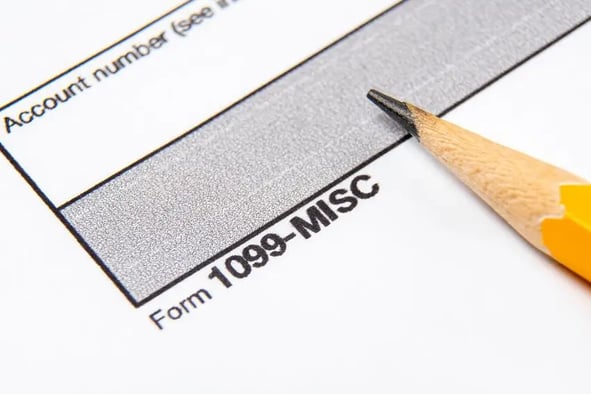
Do I have to report all of my 1099 income?
Yes! In fact, if you are due to receive one or more 1099 forms this tax season, you bear a more burdensome recordkeeping duty than employees whose income is reported only on W-2s. Particularly if you are an independent contractor, you may receive a large number of 1099s. Some who have hired you may neglect to send the form to you. Regardless of the number of forms you receive or fail to receive, you are responsible for reporting to the IRS all income that should have been reported on this form. The IRS receives a copy of each Form 1099. Failure to report one or more of these amounts will certainly trigger questions from the IRS, if not a full audit.
Who receives 1099s?
Independent contractors are not the only taxpayers who report income via a 1099 form. There are 1099s for a variety of income sources that are not wages, salaries, or tips, which are reported on Form W-2. Independent contractors and landlords use Form 1099-MISC. Form 1099-INT reports interest income; debt forgiveness is reported as income on Form 1099-C; 1099-G is for reporting distributions from state governments, such as unemployment compensation or state tax refunds. Many other versions exist for income sources such as securities sales, real estate transactions, various types of retirement benefits, and co-op dividends.
What Should I do to Avoid Conflict with the IRS?
Keep careful track.
As mentioned above, it is crucial that you report all 1099 income, so keep careful track of the forms when they come in the mail or via email. Also check what arrives against your own records to ensure that you report all of your income, regardless of whether you receive a corresponding form. Keep all of your 1099s in a safe place, and give copies of each to your CPA.
Keep your address updated.
Make reporting your income easier by doing everything you can to ensure that you receive all of your 1099s. Make sure that issuers have your current address, and put in a forwarding order with the post office whenever you move. Particularly if you move after filing your return, you should also file Form 8822 to change your address with the IRS itself. According to the IRS, not all post offices will forward government checks, so if you fail to file Form 8822, any refund you expect to receive in the mail may be significantly delayed.
Be alert for errors.
Check all incoming 1099s against your own records to ensure accuracy. Issuers have an additional 30 days to provide copies to the IRS after the deadline for submitting them to recipients. This means that you may have time to request that an issuer correct any errors prior to submitting the form to the IRS. This streamlines the process. If the issuer has already submitted an incorrect 1099 to the IRS, then you should request that they file a corrected form as soon as possible. They must check the box indicating that the form is correcting a prior 1099 rather than reporting additional income. That box is very important, since failing to check it will increase your income reported to the IRS by whatever amount appears on the form.
Keep your records.
Under common circumstances, the IRS has 3 years after you file your return to question it. At the bare minimum, you should keep all of your tax records for this period of time. If you underestimate your income by 25% or more, the IRS has 6 years to begin an investigation. Most records can be cycled out after 7 years, but you should always keep copies of your tax returns.
Dave Boelman and Jason Shaw are CPAs with over 20 years of experience. Boelman Shaw Capital Partners can assist you in preparing your income taxes and will represent you with the IRS in case issues arise with your return. Contact us today to schedule your appointment to prepare your return.
Tax and accounting services provided through Boelman Shaw & Company, LLC. Advisory services provided through BSC Capital Partners, LLC a state of Iowa registered investment advisor.
